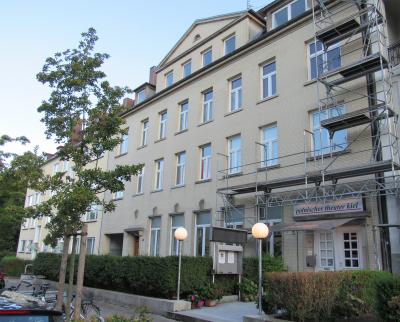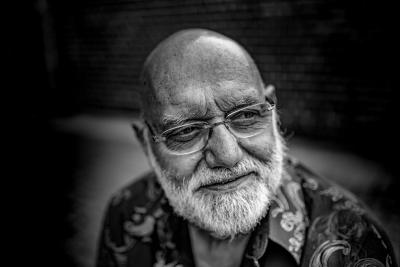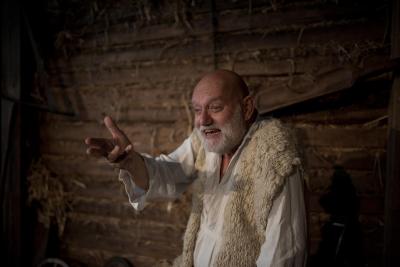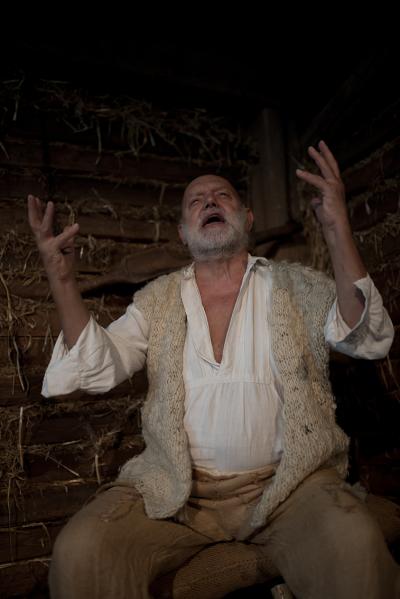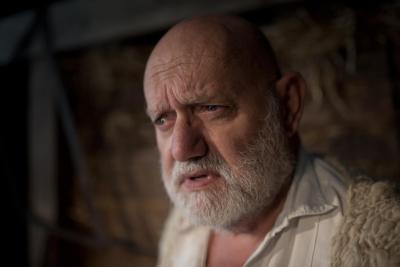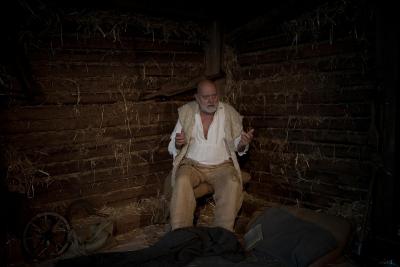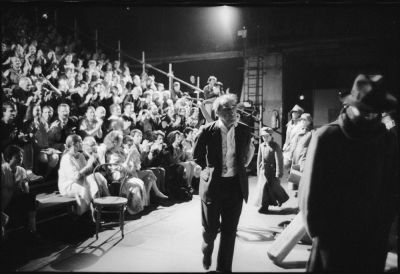Polish Theatre Kiel

Gimpel is an extreme figure. He is not only a fool, as Isaac Bashevis Singer writes in his eponymous story. Since his school days he has also had other names: moron, donkey, fool, idiot, dickhead and drip. From time immemorial it was possible to tell him stories full of lies, all of which he believed. When he fled from a barking dog that didn't exist, the whole marketplace roared with laughter. The rabbi convinced him that it wasn't him but others who were fools, and finally he married a woman who pretended that her illegitimate son was her brother. But Gimpel is not really stupid. He has only a very big heart and does not want to cause trouble to those who cheat on him. He adores the child, who was born seventeen weeks after the wedding and cannot be his, loves his wife with all his soul, and every one of her secret lovers he has dismissed as a delusion. When he finally decides to divorce, during the nine months waiting period ordered by the rabbi his wife cheats on him with the journeyman from the bakery where he works. Nevertheless, he stays with her for another twenty years and the bakery that has become his property makes him a rich man. When his still young wife is lying on her deathbed all too prematurely, in order to find peace in the world beyond she confesses to him that none of her six children are his. Now his tiny, intact world collapses on him. He gives away his fortune to the children and moves out into the world, becomes a storyteller himself, lives off charity, and finally realises that the question of whether something is true or untrue only depends on the where it happens. His own life has apparently always been nothing but love. He will definitely see his beloved wife again in the afterlife: and over there, according to Singer, "even Gimpel can no longer be made a fool of“.[1]
Singer's story "Gimpel the Fool" takes place in Poland, in a place called Frampol, forty kilometers south of Lublin. The Jewish-Polish author, who was born in 1902 in Leoncin in Mazovia, emigrated to the USA in 1935 and died there in 1991. As in all his novels and stories, the background here is the life in the shtetl that has been lost forever, i.e. in the Jewish settlements in eastern Europe before the National Socialists wiped them out. But his main themes are the all too human aspects: the conflict between the mind and the body, virtue and vice, and above all between the two sexes. In 1978 Singer was awarded the Nobel Prize for Literature. "Gimpel the Fool" was first published in New York in 1957. In 1968 Rohwolt published the first German edition, and in 2000 the seventh and apparently last edition of the collection of eponymous stories. Originally written in Yiddish, the German version is based on the American text, as the author wished. Singer needs no more than 19 pages in the paperback edition to give his readers a masterly description of the ups and downs of a whole life. Here readers will either recognize their own behaviour, especially their self-deception, or they will dismiss tragicomedy as a moral concept from a world long past. But can this relatively short text carry an entire theatre evening?
[1] Isaac Bashevis Singer: Gimpel der Narr. Ausgewählte Erzählungen. Deutsch von Wolfgang von Einsiedel, Hamburg: Rowohlt 1982, page 24
As early as the first minute Tadeusz Galia in the role of Gimpel brings tears to one's eyes. As soon as he wakes up on his straw bed, he stands in front of the audience with his long felt boots, patched linen trousers and a waistcoat knitted from coarse sheep's wool. His face alternates between deep shame at having to make a public confession to the audience about his life and sheer despair about his own botched existence. From the very first moment we are caught up by the language, the fact that he does not hide his Polish accent, and his sometimes frugal, at other times sweeping gestures; not to speak of his changing emotions and moods: fondness, affection and indignation, hope and sorrow, accusation and forgiveness, self-deception and insight, melancholy and fate, which often alternate within a single sentence or turn into the opposite. Gimpel's monologue, which he delivers even while eating and smoking a pipe, lasts exactly one hour, when the audience's perceptible consternation turns into enthusiastic applause.
The three by two metre stage set depicts the corner of a barn made of coarse wooden beams that are sealed with clay and straw. The milking stool with a straw sack, on which Gimpel takes a seat from time to time, the wagon wheel, pitchfork, saw, axe, bowl and jug depict the place he found near a peasant's farm during his travels. His costume has been designed by Meike Neumann, the set by Galia, and the director is Jutta Ziemke. Galia discovered Gimpel (which is in the repertoire of the Polish Theatre Kiel with two other plays in the summer and autumn season 2018), in 1981 and translated it from Polish into German. Anyone who knows the American translation published by Rowohlt will not notice any differences. The first performance took place in 1985 in the Molfsee Open Air Museum near Kiel.
Since then Galia has played Gimpel so often that he stopped counting after 1,500 performances. He plays it at guest appearances in other privately-run theatres all over Germany, at events, in barns, schools, retirement and nursing homes and even in front of mentally handicapped people, and the subsequent discussions with the audience show that this also works excellently with the latter. Nevertheless, the play has not become routine. In a personal conversation before the performance at the Polish Theatre in Kiel, Galia admitted that he was still terribly nervous before every performance, and he wondered every time whether he would succeed yet again in bringing Gimpel back to life. Each time, the emotions and images arise anew, the way the story is told and the mood it creates are slightly different. At the second to last of the seven shows at 8 pm on Fridays and Saturdays, only twenty of the forty-five seats are occupied. However, it is pleasing to note that the audience is mixed and includes school pupils and students.
Galia was born in 1949 in Wrocław/Breslau and graduated in 1971 from the State Academy for Film, Television and Theatre/Państwowa Wyższa Szkoła Filmowa, Telewizyjna i Teatralna im. Leona Schillera in Łódź. From 1971 to 1976 and 1977 to 1982 he was a member of the Edmund Wierciński Contemporary Theatre/Teatr Współczesny im. Edmunda Wiercińskiego in Wroclaw, directed a private theatre in Wroclaw City Hall and worked as a lecturer at the local drama school. In 1976/77 he performed in the Jan-Kochanowski Theatre/Teatr. Jana Kochanowskiego in Opole.[2] In addition he appeared in film and television productions.[3] When martial law was imposed in Poland in 1981 he refused to sign a long declaration of loyalty to the new state doctrine, and was suspended from teaching the following day. He then used an international theatre festival in Mannheim and Esslingen to escape to Germany. The only friend he knew here lived in Kiel. During a workshop at the Kieler Schauspielhaus, a group of Polish actors founded an initiative entitled 'Polish Theatre in Deutschland e.V.' and on 21stApril 1983, at the Kieler Ball Pompös (today's Max Nachttheater), they performed the farce "Indyk"/"The Turkey" by Sławomir Mrożek in Polish with seventeen actors. It was the hour of birth of the Polish Theatre Kiel. But after only three performances it was clear that the Polish-speaking audience in Kiel was too small to meet future demands. When the acting company broke up, Galia took over as director, a post he still holds today. Since then the theatre has been playing in German. According to Galia, for a long time he simply memorised the German texts without knowing what he was talking about.
After three years of playing on various stages, the theatre found its permanent home on the ground floor of a 1920s apartment building at Düppelstraße 61a in the Düsternbrook district of Kiel, twelve minutes by bus from the main railway station. The audience has remained faithful to this classical one-room theatre. Indeed its enthusiasm has been such, that by the 36thyear of its existence it had staged eighty-seven productions and counted two thousand five hundred visitors per year. In 1991 Galia was awarded the Friedrich-Hebbel-Prize for being a "mediator between East and West". The prize is given by a foundation in Kiel, which honours artists living in Northern Germany whose achievements "go well beyond the average". In 1994 he was awarded the Culture Prize of the City of Kiel.
Over the years numerous directors, over seventy actors, fifteen stage designers and sixteen costume designers, innumerable musicians, technicians, photographers and assistant directors have worked at the theatre. The state of Schleswig-Holstein and the city of Kiel share the basic funding costs, around 60,000 Euros (2003). The box office income flows into the day-to-day running of the theatre, while the actors, technicians and numerous other helpers work without salary, on a voluntary basis. A number of activities could only be undertaken with the support of the local job centre and the Kiel employment and training company. Numerous productions could only be staged with a core company around Galia and the actresses Jutta Ziemke and Meike Neumann. Both have been with the theatre since its early days, helping to build it up and decisively shaping its programme and image. So far Ziemke has played in thirty-one productions. Neumann, who studied at the acting school in Kiel, was the first German actress to join the theatre in 1983 and has since been responsible for selecting the plays, the dramaturgy, make-up and costumes.[4] Since her serious illness, Kiel drama students have been standing in for her. Guest appearances have been made by the actor Astrit Geci from Kosovo, Linda Stach from Duisburg, Antje Schlaich, who completed her training at the Kiel Drama School in 2016, the Kiel actor Martin Friederichs, the freelance actress Christina Dobirr, Elena Schmidt-Arras from the Hochschule für Musik und Theater in Hannover, and Oleksandra Zapolska from Odessa. If an ensemble member drops out, the grants from the state and the city of Kiel are sometimes cut, which then plunges the theatre into even greater difficulties.
[2]Encyklopedia teatru polskiego, http://encyklopediateatru.pl/osoby/10358/tadeusz-galia
[3]Internetowa baza filmu polskiego, http://www.filmpolski.pl/fp/index.php?osoba=111508
[4]Christoph Munk: „Ob ich mich richtig freue“, in: Kieler Nachrichtenvom 7.5.2003, reprinted in the programme for “Gimpel the Fool”, Polish Theatre Kiel; Ricarda Richter: „Wie ein besoffenes Baby im Nebel“. Im Polnischen Theater wird Deutsch gesprochen – und aus Leidenschaft gespielt, in: Der Albrecht. University newspaper: Christian-Albrechts-Universität zu Kiel, 2016, re-published on the home page of the Polish Theatre Kiel, https://www.polnisches-theater-kiel.de/presse_2.html
Staging two to three performances a year also means constantly searching for new plays and texts that can be produced with as little human and financial resources as possible. From the very beginning, the theatre has made it its mission to introduce plays by Polish and other Eastern European authors. But the repertoire also includes less familiar or newly found Western literature. The team is not interested in light entertainment, but in dealing with questions of human existence in a realistic manner. Now it is becoming more and more difficult to find new plays by young authors, complains Galia, because not only the quality must be right, but also the author royalties and the agency fees must be affordable. The original support association Initiative Polnisches Theater Kiel e.V., which sponsors the theatre, is still working today to win a regular and committed audience that gets free admission to previews for an inexpensive annual subscription.
If you take a look at the programme over the past six years, you will find an exciting mixture of authors and world premieres alongside classics, unknown works and plays from Poland.[5] The Dutch playwright Lot Vekemans (*1965) was featured with her relationship drama "Gift" in 2012, and once again in 2015 with a story of the biblical Judas, played by Galia. In December 2012, a comedy about the famous lying Baron von Münchhausen, "The Flight of the Roasted Duck" by the Georgian author Grigori Gorin (1940-2000), was staged with twelve characters. In 2013 two classics were presented: "The Maids" by the French playwright and novelist Jean Genet (1910-1986) and the 1983 comedy "Halpern and Johnson" by the London playwright Lionel Goldstein (*1935). In 2014 Jutta Ziemke, Tadeusz Galia, Gina Tantow, Kristina Greif and Natalie Baron appeared in the play "Kammerjagd" by the actor and director Andreas Hüttner (*1969) from Wittenberg. Hüttner lives in Kiel and had written the play for the actors in a collaboration lasting months. At the centre of the drama is a retired teacher named Gertraude and her Polish neighbour. Gertraude sees in her acquaintance nothing more than a handyman from the East who is only good enough to do the dirty work. Everything culminates in a scandal at a birthday party with friends.
In April 2015 and 2016 respectively, the programme included two-person plays. In the contemporary drama "Enigma" by the French-Belgian novelist, playwright and film director Éric-Emmanuel Schmitt (*1960), Galia and Friederichs played out an interview between a provincial journalist and an eccentric literary prizewinner, which turned into a duel of words about life and death. By contrast, "Boston" by the Danish author Kaj Nissen (*1941), was a desperate dialogue between an aging married couple, played by Ziemke and Galia, about a love grown cold and its revival. In August 2015 Galia appeared in the play "Königlicher Totengräber" ("The Royal Gravedigger") by Jerzy Łukosz, a playwright, essayist, literary critic and translator born in 1958 in Wroclaw: here he played a Polish emigrant who is forced to struggle to scrape a living in Germany as a cremator. The guest worker ad the intellectual played by Galia and Astrit Geci, are also "emigrants" in the eponymous play by Sławomir Mrożek. Mrożek, a representative of the Absurd Theatre, himself went into political exile to France in 1968 and then lived in Mexico for six years before returning to Poland in 1996. In September 2017, this production was followed by Václav Havel's (1936-2011) one-act play "Protest", depicting his experiences as a politically persecuted writer. In January 2018, the play "Bombshells" by the Australian playwright Joanna Murray-Smith (*1962) - it depicts six portraits of women between the ages of 15 and 57 - was performed with great success by the acting student Oleksandra Zapolska, followed by Antje Schlaich, who returned to the Polish Theatre Kiel after five years.
[5]The archive on the home page of the Polish Theatre Kiel, https://www.polnisches-theater-kiel.de/archiv.php
After "Gimpel the Fool", a premiere of "Neues von Kellermanns" by Ursula Haucke (1924-2014), writer of screenplays, plays and radio plays in Berlin, opened in September 2018. Haucke became famous not only for her play "Frühstück bei Kellermanns", (premiered in 1982 and filmed in 2007), but also for the radio play series "Papa, Charly hat gesagt". In December, the one-person play "Ein ganz gewöhnlicher Jude" by the Swiss author Charles Lewinsky (*1946), played by Astrit Geci, will be staged: and in January 2019 the theatre will present a grotesque debut play entitled "Tod sind wir nicht" by Svenja Viola Bungarten (*1992) about the yearnings of two older women.
Lastly, the existence of the Polish Theatre Kiel was threatened in 1992, when a fire completely destroyed the theatre. But it was saved by donations from the citizens of Kiel and from public authorities. The building in Düppelstraße was recently inherited, and the theatre was closed down as part of a luxury renovation project. Daily harassment like the disconnection of the high-voltage electricity supply tore at the nerves of the theatre team. But everything has turned out well. The new lessor has agreed to a fresh ten-year lease and will probably also cover the costs of the electrical installations. If everything goes well, the Polish Theatre Kiel's invaluable contribution to over thirty-five years of vibrant theatre culture will be continued.
Axel Feuß, September 2018
A video film entitled “Leben für die Kunst” by Elisabeth Saggau on the work of the Polish Theatre Kiel containing scenes from rehearsals and shows as well as reminiscences by Tadeusz Galia (2012, 1 hour and 14 minutes) can be purchased in the theatre for a mere 10.00€.
